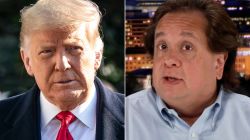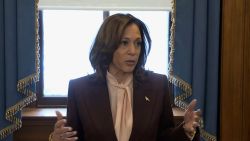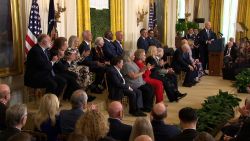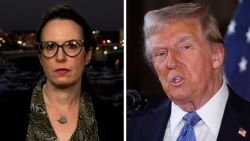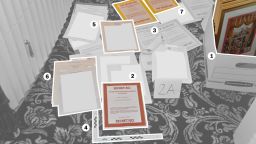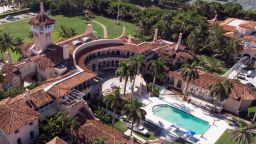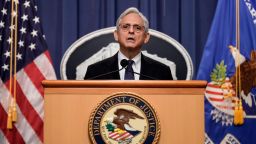US government documents were “likely concealed and removed” from a storage room at Mar-a-Lago as part of an effort to “obstruct” the FBI’s investigation into former President Donald Trump’s potential mishandling of classified materials, the Justice Department said in a blockbuster court filing Tuesday night.
More than 320 classified documents have now been recovered from Mar-a-Lago, the Justice Department said, including more than 100 in the FBI search earlier this month.
Tuesday’s filing represents the Justice Department’s strongest case to date that Trump concealed classified material he was keeping at Mar-a-Lago in an attempt to obstruct the FBI’s investigation into the potential mishandling of classified material.
The Justice Department revealed the startling new details as part of its move to oppose Trump’s effort to intervene in the federal investigation that led to the search of his Florida resort and his desire for a “special master” to be appointed to the case.
Trump has pushed an “incomplete and inaccurate narrative” in his recent court filings about the Mar-a-Lago search, the Justice Department said.
“The government provides below a detailed recitation of the relevant facts, many of which are provided to correct the incomplete and inaccurate narrative set forth in Plaintiff’s filings,” prosecutors wrote.
It presents a strong rebuttal of the criticisms of the FBI’s unprecedented search of a former President’s residence, laying out clearly how Trump had failed to return dozens of classified documents even after his lawyer attested that he had provided all classified material in his possession.

A picture on the final page of the filing showing classified documents arrayed on the floor of Trump’s office – full of highly classified markings like “HCS,” meaning human intelligence sources – hammered home how sensitive the material Trump had taken was.
At issue is Trump’s compliance with a grand jury subpoena, issued in May, demanding that he turn over classified documents from Mar-a-Lago. Prosecutors said Tuesday that some documents were likely removed from a storage room before Trump’s lawyers examined the area, while they were trying to comply with the subpoena. The timeline is essential, because Trump’s lawyers later told investigators that they searched the storage area and that all classified documents were accounted for.
“The government also developed evidence that government records were likely concealed and removed from the Storage Room and that efforts were likely taken to obstruct the government’s investigation,” prosecutors wrote. “This included evidence indicating that boxes formerly in the Storage Room were not returned prior to counsel’s review.”
The allegations came after the DOJ’s filing went into specific detail about actions from Trump’s team that the department implies were obstructive to its probe.
In the filing opposing Trump’s request, DOJ argues that the former president lacks standing over presidential records “because those records do not belong to him,” as presidential records are considered property of the government.
The Presidential Records Act makes clear that “[t]he United States” has “complete ownership, possession, and control of them,” the DOJ filing states.
Trump has argued that his constitutional rights have been violated and that some of the documents seized earlier this month contain material covered by privilege – particularly executive privilege.
The Justice Department was ordered to submit the filing by Judge Aileen Cannon, who has already indicated she is inclined to grant Trump’s request for third party oversight of documents the FBI seized Mar-a-Lago.
The role of a special master is to filter out any materials seized in a search that don’t belong in the hands of investigators because of a privilege. Special masters have been used in high-profile cases before, but usually in cases where the FBI has searched an attorney’s office or home and there is a need to filter out materials concerning attorney-client privilege. Trump’s request has centered on the need to protect documents concerning executive privilege from his conduct as president.
Signals from Cannon, a Trump appointee, that she is leaning toward appointing a special master in the Mar-a-Lago search have raised eyebrows among legal observers. For one, Trump filed his request for the appointment two weeks after the search of his Florida home, risking the potential that the Justice Department is already done with the bulk of its review. Secondly, Trump and the judge alike have pointed to civil rules concerning special master appointments, when the search warrant is arising in a criminal context.
Since the August 8 search, a number of previously secret court filings the DOJ submitted to obtain the warrant have been made partially public in part because of a bid for transparency filed in court by several media organizations, including CNN.
Those redacted documents have revealed that the search was connected to a DOJ investigation into alleged violations of the Espionage Act, criminal mishandling of government documents and obstruction of justice. According to an FBI affidavit that was released last week, an FBI review of 15 boxes retrieved by the National Archives from Mar-a-Lago in January found 184 documents bearing classification markings – some of them identified as particularly sensitive government documents.
Trump, in seeking the special master, has stressed in court filings the lack of criminal enforcement in the Presidential Records Act, a Watergate-era law laying out the process for preserving presidential records. He did not mention the three criminal statutes the DOJ cited in its warrant documents. Trump’s lawyers have also emphasized his supposedly unfettered ability when he was president to declassify documents, though the statutes in question don’t require that the materials be classified.
Wednesday morning, Trump posted on his social media platform on Truth Social for the first time since the Justice Department filing and once again claimed to have declassified documents that were found at his Mar-a-Lago residence.
In one of his most recent posts, Trump appeared to comment on the photo of top-secret documents laid out on the floor, saying, “Terrible the way the FBI… threw documents haphazardly all over the floor,” and, “Lucky I Declassified!”
In other posts, he attacked the FBI and DOJ generally and said, “This is the time, after many years of lawbreaking & unfairness, to clean things up. All things for a reason. DRAIN THE SWAMP!!!” He repeated his false claims of a stolen election and said, “Our Country is going to hell!” He also claimed crowds are “already forming” for his rally on Saturday.
Trump’s attorney limited what DOJ could look at during June visit
A top Justice Department official contends that federal investigators were limited in what they could look through when visiting the resort in June – contrary to the Trump team’s narrative of total cooperation.
Trump’s lawyer requested that the FBI come to the resort to pick up the documents after the Trump team had received a grand jury subpoena in May seeking any materials marked classified, according to the Justice Department.
DOJ’s account also undermined claims by Trump and his allies that the former President had declassified the materials in question.
“When producing the documents, neither counsel nor the custodian asserted that the former President had declassified the documents or asserted any claim of executive privilege,” the filing said. “Instead, counsel handled them in a manner that suggested counsel believed that the documents were classified: the production included a single Redweld envelope, double-wrapped in tape, containing the document.”
In the DOJ’s account, Trump’s lawyer said that all the remaining documents from Trump’s White House were being kept in the storage at Mar-a-Lago. “Counsel further represented that there were no other records stored in any private office space or other location at the Premises and that all available boxes were searched,” the filing said.
Prosecutors confirmed Trump’s assertion that the visiting DOJ and FBI officials were then allowed to visit the storage area.
“Critically, however, the former President’s counsel explicitly prohibited government personnel from opening or looking inside any of the boxes that remained in the storage room, giving no opportunity for the government to confirm that no documents with classification markings remained,” the DOJ said.
DOJ reveals grand jury proceedings related to Mar-a-Lago search happening in DC
The Justice Department confirmed that grand jury subpoenas had been issued in its probe, and that the grand jury that issued them had been empaneled in DC. The department included a copy of a May 11 subpoena for government records at Mar-a-Lago marked as classified that indicated the existence of the DC federal grand jury. Before making the subpoena public, the department on Monday got permission to do so from Chief Judge Beryl Howell in the DC District Court, according to a footnote in its brief.
The reference to Howell suggests that in addition to Magistrate Judge Bruce Reinhart and Cannon in Florida, a third judge is now involved in the DOJ’s probe.
This story has been updated with additional details.





